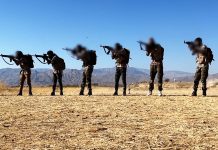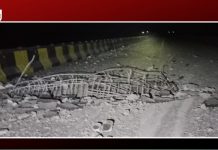By Lawrence Sellin
It seems like all the players in the South Asian power game think Balochistan, Pakistan’s southwest province on the Arabian Sea, is important – except the United States.
For the sake of argument, imagine that Balochistan reverts to its previous condition as an independent and secular state before it was forcibly incorporated into Pakistan or, more simply, is a blank space on the map.
Here are a few things that would change.
– The single most important Taliban safe haven, training and support infrastructure would be eliminated, isolating the Taliban’s Peshawar Shura and the Haqqani Network to be dismantled piecemeal.
– Afghanistan would have a reliable route to the sea and no longer be subjected to Pakistan’s economic stranglehold.
– An embryonic transnational terrorist epicenter containing the Islamic State (ISIS) and other extremist Wahhabi groups would be prevented.
– The flow of opium and heroin originating in Afghanistan, which fuels the Taliban, other insurgent elements and the world’s illicit drug market, would be disrupted.
– Chinese regional hegemony as represented by the China-Pakistan Economic Corridor (CPEC) and the related construction of Chinese military bases on the Arabian Sea would be thwarted.
– Iranian infiltration and military action in Balochistan to counter groups supported by Pakistan and Saudi Arabian would be halted and reduce the likelihood of another Syria-like crisis.
– An independent and secular Balochistan would drive a stake into the heart of Pakistan’s Islamization policy and its reliance on Islamic terrorism as an instrument of its foreign policy.
Two questions arise from those speculations.
Why is the U.S. still fighting a war in Afghanistan under rules of engagement determined by Pakistan?
Why is the U.S. not exploiting opportunities to influence the strategic conditions in South Asia that might favorable affect the outcome in Afghanistan and future American influence in the region?
The ugly truth is that, lacking any new ideas or alternative approaches, the counterinsurgency and nation-building program in Afghanistan remains on automatic pilot, where everyone is being reassured that everything is going according to plan and that “progress is being made.”
Within the military bureaucracy, the tendency to give and accept happy talk is pervasive. Negative views can only be expressed as whispers in private conversations. Public criticism is suicide and, contrary to popular belief, changing the system from within is at best serendipity or at worst urban myth. In a system highly resistant to change, innovative thinking can be a risky proposition.
Military careerism fosters the development of political correctness, a finely-tuned sense of risk aversion, and a laissez-faire attitude toward demonstrable progress, where the appearance, rather than the substance of success, is a satisfactory outcome. The longer you are in such an environment, the more the bureaucracy can shape your thinking and behavior. You become a stakeholder in maintaining the status quo.
Current U.S. strategy in Afghanistan is not designed to win, but not to lose, until a graceful exit can be achieved. Even if a long-term presence could be sustained, it is not a viable strategy when Pakistan determines what is sustainable.
The time is long overdue to take a serious, comprehensive look at the manner in which the war in Afghanistan is being conducted, whether the continued and exclusive pursuit of a yet unsuccessful 16-year-old strategy is, in actuality, suppressing our options and setting us up for future failure.
Lawrence Sellin, Ph.D. is a retired colonel with 29 years of service in the US Army Reserve and a veteran of Afghanistan and Iraq. Colonel Sellin is the author of “Restoring the Republic: Arguments for a Second American Revolution “. He receives email at lawrence.sellin@gmail.com.






























